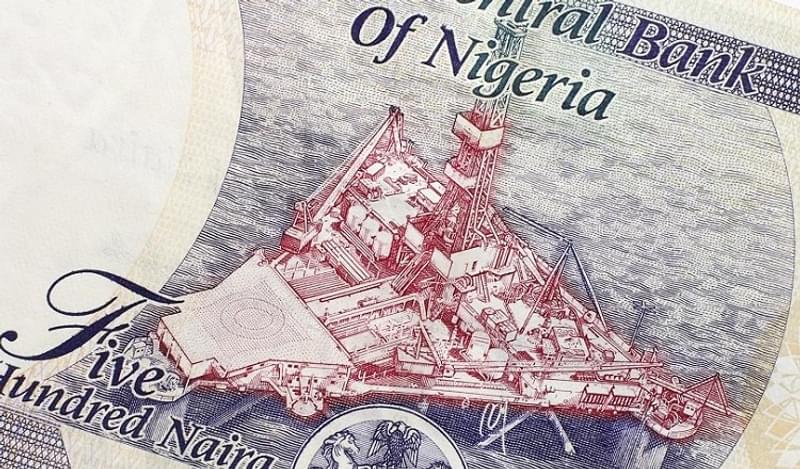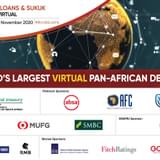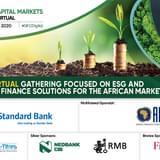The Nigerian naira has been on a rollercoaster ride for the past 12 months, pressed by low oil prices and sporadic government FX auctions aimed to prop up the currency. The recent introduction of separate exchange windows for different sectors appears to have partially closed the gap between the official and parallel market rates, although the spread is still wide, and volatile enough for investors to be cagey.
When the oil price plummeted in 2014, many of the biggest producers, like Russia, Kazakhstan and Colombia, risked seeing consumer prices skyrocket and hiked their interest rates, but largely let their currencies float. Nigeria went a different way, imposing an official exchange rate that immediately lead to an emergence of a parallel exchange market and dollar liquidity dried up.
By June 2016, the CBN finally abandoned the year-and-a-half long currency peg, which stood at NGN196 to the dollar, and allowed the currency to depreciate to an official rate of NGN305, while on the black market it fell as low as NGN525 to the US dollar.
The discrepancy between the various rates and volatility stemming from fluctuating commodities prices led to a lot of speculative trades on the naira, growing hard currency shortages and the return of dodgy transactions. One such scheme, called “round tripping” (or “Lazy Susans”), involves nearly simultaneous sale and sale-back of assets in naira and dollars – a way of gaining access to dollars via non-market deals.
As Capital Economics Africa economist John Ashbourne pointed out, this approach also led to a spike in consumer prices.
“The government’s first response to the dropping oil prices was to try and keep the currency stable at the official rates,” explained Ashbourne. “While they succeeded at keeping the rate steady after a minor devaluation, effectively no one was able to use the official rate, and a lot of sectors were pushed out to the black market – and THAT was the rate that had the biggest impact on inflation and prices.”
“So, the government’s ultimate goal – maintaining the FX rate to keep inflationary pressures down – clearly wasn’t achieved,” the expert concluded.
In recent weeks, the Central Bank continued to tinker with the FX system, introducing a more flexible rate and providing separate “exchange windows” for investors and exporters to buy dollars – all the while, continuing to prop the official rate via currency interventions. Just last week it had sold US$482.6mn from its reserves, which currently stand at around US$30bn.
Ashbourne noted two additional measures recently introduced by the government. The first was to open up a new exchange rate for investors and exporters, which is market determined and has largely converged with the parallel rate, indicating that the latter is a reasonable gauge of the currency’s true value. But still, the investors and exporters’ rate is quite small, so only a small subset of the market actually rely on it.
“The second measure was that the CBN has been dumping a lot of hard-currency into the FX market, which has caused the Naira on the parallel market to strengthen against the US dollar.”
According to the economist, that was made possible by two factors: the recent sovereign Eurobond, which brought a lot of dollars into the country; and the slight recovery in oil prices in recent months, as well as production edging up.
“For now that approach has been sustainable, so we still have multiple rates now, but the gap between official and black market rates has narrowed a bit.”
The idea of a currency window offers investors a separate market in which, theoretically, they will be able to trade the currency much more freely. Authorities have been promising to make sure prices move “based on the managed-float regime”, while also claiming that if there are willing buyer and sellers, “there will be no form of any price intervention.”
Among types of transactions eligible for these windows were interest payments, capital repatriation and remittances, with banks, portfolio investors, exporters and the Central Bank getting permission to sell hard currency.
However, creating additional exchange rates is making the system more clunky and overly complicated. Reuters listed six(!) different exchange rates: the official rate, the black market, a rate for Muslim pilgrims visiting Saudi Arabia, a retail rate set by licensed exchange bureaus and a rate for funding foreign travel and school fees.
Ashbourne surmised that since those rates are open to a small number of people, they don’t affect the big picture very much, with the official and the parallel rates still being most significant, and mostly the latter impacting prices in the economy.
“But it is true that they’ve built up this incredibly convoluted system, which is open to corruption and waste, with the gaps between currency windows allowing speculators to buy at one rate and sell at another. Long-term, they need to aim to narrow and eventually abolish the gap between these different rates.”
According to a recent Moody’s report on Nigeria, the change in policy has had a significant impact on liquidity, driving a steady decline in the spread of the parallel rate over the official rate. Notably, though, it also coincided with a sustained recovery in oil production, signalling that the worst of the damage to growth and external accounts from the oil price shock has passed.
This leads Moody’s to conclude that the improvement in FX availability is “more cyclical than structural”, stemming from US$1.5bn in international debt issuances and a spike in oil production in Q12017 on the back of oil’s recent recovery.
Ashbourne agreed that significance of production volumes cannot be overestimated.
“With the current system of throwing dollars at the parallel market, that only works if oil production stays at least at the current level. So if the security situation were to deteriorate, that approach would become unsustainable.”
The initial introduction of FX windows had an albeit limited positive impact. The Lagos Stock Exchange has surged to a seven-month high in anticipation of foreign investors’ return. Local traders say there are more inquiries from abroad about naira-denominated bonds, which yield a juicy 16-18%.
But real capital is still hard to come by. The naira was remained stable this week, at NGN375 per dollar in the parallel market. But investors who in the past bought into up to US$5bn worth of Nigerian debt, are unwilling to sell dollars for less that NGN400 to the dollar, while the government, committed to keeping the currency from weakening, is reluctant to settle for less than the interbank rate and is encouraging local production and import substitution.
“Why exactly should we spend scarce FX resources paying for things we can produce here in Nigeria? I believe that only entrenched interests, who do not have the interests of ordinary Nigerians at heart, would want us to do so,” CBN Governor, Mr. Godwin Emefiele said recently.
With the currency still susceptible to waves of volatility and an economy still contracting, Ashbourne says that more effort needs to go in to reforms and attracting investors.
“Investors want to see more reforms to the exchange system – for example, if they increased the amount of money being provided at investors; guaranteeing that exporters rated remains market-driven for the foreseeable future. Higher interest rates would probably have a positive impact, demonstrating that the CBN is serious about tackling the inflation problem. But based on the odd policy making by the CBN over the past year, I think it would take a big effort to restore its credibility and be taken seriously again.”
It is evident that the currency windows have provided opportunities for capital to start trickling back into the country. But, to hyperbolize the analogy, the government is trying to patch up the problems with boarded-up exchange windows. That works as a temporary measure, but only glass windows – however fragile – will insure better transparency and greater trust from investors going forward.









